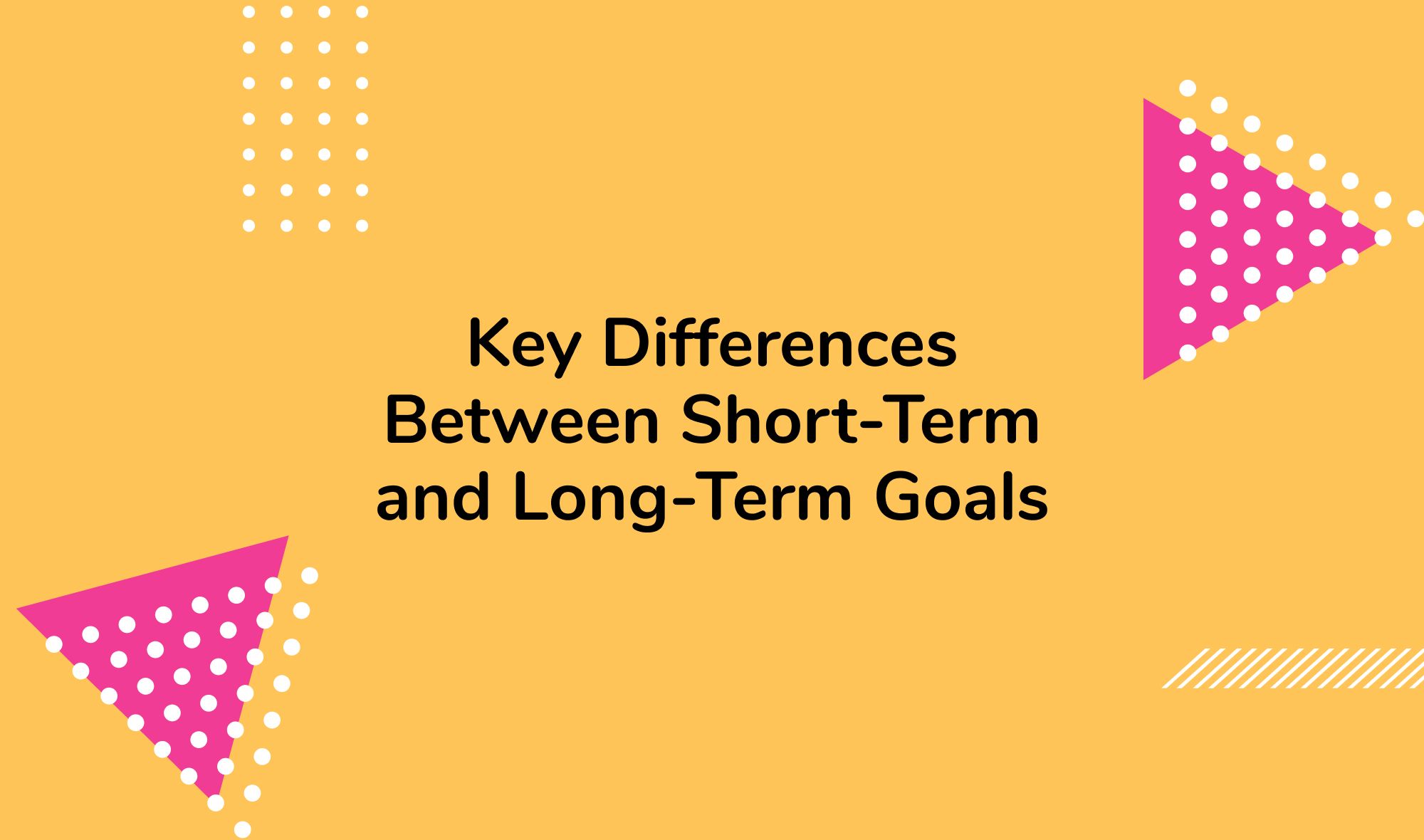How Do Short-Term Goals Differ From Long-Term Goals: The Key Differences
By Marco Franzoni • July 25, 2023
Key Takeaways
- Short-term and long-term goals differ mainly in their timeframe, flexibility, and the degree of planning required.
- Short-term goals are vital stepping stones towards achieving long-term goals, providing a roadmap for daily actions and decisions.
- The understanding and effective setting of both short and long-term goals are crucial for personal development and life fulfillment.
- It's important to maintain a balance between these two types of goals to ensure consistent progress and motivation.
- Both types of goals are interdependent, and success in the long-term often relies on the accomplishment of several short-term objectives.

In the journey of personal development and progress, understanding the intricacies of goal-setting is crucial. It's a common understanding that goals are the stepping stones to success, but what often goes unnoticed is the difference between short-term and long-term goals. This distinction is critical as these two types of goals, while interrelated, serve unique purposes and require different strategies for achievement.
In this blog post, we will delve into the key differences between short-term and long-term goals and explain their respective roles in shaping our near future and overall life direction. By understanding these differences, you will be better equipped to set and pursue goals that align with your vision for personal development and future planning.
Whether you're looking to improve your professional life or enhance your personal growth, gaining a solid understanding of these two types of goals will provide a stronger foundation for your journey. Let's dive in and explore the fascinating interplay between short-term and long-term goals and the key role they play in our lives.
Join our Newsletter
Transform your career with our personal growth insights. Get one valuable tip right in your inbox every Saturday morning.
Defining Goals
Before we delve into the key differences between short-term and long-term goals, let's first define these terms and discuss their unique characteristics and examples.
What are Short-Term Goals?
Short-term goals are objectives set to be achieved within a short timespan, often within a few weeks to a few months. These goals usually require fewer steps to complete and tend to focus on the immediate or near future. They serve as building blocks towards achieving longer-term objectives and are integral for personal development and progress in our daily life. You can learn more about goal setting in general in our comprehensive blog.
Characteristics of Short-Term Goals
- Shorter Timeframe: As the name suggests, short-term goals are bound by a limited time frame. They're typically designed to be achieved within a year.
- Specificity: Short-term goals tend to be very specific, focusing on one area of your life or career.
- Actionable Steps: These goals are often accompanied by clear, actionable steps to facilitate achievement.
- Flexibility: Short-term goals provide more room for adjustments as they are set for the near future.
Examples of Short-Term Goals
- Fitness Goal: Losing a certain amount of weight within a month.
- Personal Goal: Reading a new book every week.
- Professional Goal: Acquiring a new skill set relevant to your job within the next three months.
What are Long-Term Goals?
On the other hand, long-term goals are objectives set to be achieved over an extended period, often years. They represent our ultimate vision for the future and require meticulous planning, commitment, and multiple steps to achieve. They are integral to personal and professional development and give a clear picture of what we aspire to in the distant future. If you're a millennial, understanding and setting long-term goals is crucial for career progression, as discussed in our post on millennial employees.
Characteristics of Long-Term Goals
- Extended Timeframe: Long-term goals are set for the far future, often spanning several years.
- Broad Scope: Unlike short-term goals, long-term ones often encompass a broader aspect of your life or career.
- Sequential: Long-term goals are usually composed of several short-term goals that lead to the ultimate goal.
- Persistence: Achieving long-term goals requires persistence, as they tend to be complex and challenging.
Examples of Long-Term Goals
- Education Goal: Completing a Master's degree within the next two to three years.
- Financial Goal: Building an emergency fund of a specific amount in five years.
- Career Goal: Climbing the corporate ladder to reach a senior management position within ten years.
Key Differences Between Short-Term and Long-Term Goals

Now that we understand what short-term and long-term goals are, let's dive into the key differences that set them apart. Understanding these distinctions can help overcome feelings of self-doubt and lead to more effective goal setting.
Overview of the Main Differences
There are several differences between short-term and long-term goals that stem from their timeframe, focus, and flexibility. Here's an overview of the main differences:
- Timeframe: Short-term goals are set for the near future, typically to be achieved within a year. Long-term goals, on the other hand, are set for the distant future and may take several years to accomplish.
- Scope: Short-term goals are often more specific and focus on one area of life or career. Long-term goals tend to be broader, encapsulating larger life or career aspirations.
- Complexity: Long-term goals usually require more steps and are often broken down into several short-term goals. Short-term goals are simpler and require fewer steps to complete.
- Flexibility: Short-term goals are more adaptable to changes in circumstances, while long-term goals require more commitment and long-term planning.
Join our Newsletter
Transform your career with our personal growth insights. Get one valuable tip right in your inbox every Saturday morning.
The Role of Timeframe in Goal-Setting
The timeframe of your goal plays a crucial role in its formulation, execution, and success. Short-term goals, with their smaller timeframes, provide immediate direction and motivation. They allow for quick wins and help maintain a positive attitude towards achieving larger goals.
Long-term goals, with their extended timeframes, demand patience, persistence, and effective time management. They help keep the big picture in mind and provide a roadmap for life fulfillment, even though they may take years to achieve.
Flexibility and Adaptability of Short-Term Goals vs Long-Term Goals
Short-term goals offer flexibility and are adaptable to changing circumstances. This adaptability is essential in a rapidly evolving professional world, particularly in organizations fostering a culture of engagement and continuous improvement.
On the contrary, long-term goals are less flexible due to their extended timeframe and larger scope. They provide the structure and direction that keep us anchored, guiding our actions over time. Yet, they also require regular review and adjustment to remain relevant and achievable.
How Short-Term Goals Fuel Long-Term Goals

It's important to understand that short-term and long-term goals aren't mutually exclusive. In fact, they work together to create a roadmap towards achieving your ultimate goals, preventing the feeling of being overwhelmed or developing a superiority complex.
The Progression from Short-Term to Long-Term Goals
Long-term goals are often complex and require meticulous planning, patience, and time to achieve. By breaking down these larger goals into a series of manageable, short-term objectives, we can create a progression that makes the ultimate goal seem achievable.
Each short-term goal accomplished builds momentum and confidence towards the long-term goal. They provide a series of actionable steps that make the journey towards the long-term goal less daunting. This process fosters a positive attitude, helping to keep you remain motivated and focused, even when faced with challenges.
Case Studies and Examples
Let's consider a few examples to illustrate how short-term goals can fuel long-term goals:
- Career: Suppose your long-term career goal is to become a senior executive in your company. You might set a short-term goal to master a new skill, complete a key project, or earn a promotion. Each of these short-term achievements would bring you closer to your ultimate career goal.
- Personal Development: If your long-term personal goal is to achieve a healthier lifestyle, short-term goals might include incorporating exercise into your daily life, making healthier food choices, or reducing stress. As you achieve these smaller goals, you're progressing towards your larger aspiration of a healthier lifestyle.
- Education: For a student aiming for a Master's degree, short-term goals might include completing coursework, passing examinations, or finishing a thesis. Each step brings the student closer to their long-term educational goal.
In each case, the short-term goals serve as stepping stones, leading towards the achievement of the long-term goal. They turn a daunting task into a manageable process, creating a clear path towards success.
Role of Goals in Personal Development

Goals, both short-term and long-term, play a vital role in personal development. They provide direction, encourage progress, and fuel motivation. By setting and achieving goals, we not only gain the skills and experiences necessary for personal growth, but also enhance our self-confidence and self-efficacy.
How Setting and Achieving Goals Contributes to Personal Development
Setting goals, both short-term and long-term, provides a roadmap for personal development. Each goal achieved signifies a new skill mastered, a challenge overcome, or a step towards an improved self. These accomplishments instill a sense of achievement and self-worth, crucial elements for personal development.
Moreover, the process of setting and achieving goals fosters essential life skills such as time management, problem-solving, decision-making, and resilience. Short-term goals, for instance, are effective tools for improving time management skills. On the other hand, the journey towards achieving long-term goals often involves overcoming challenges and setbacks, thereby building resilience and problem-solving skills.
Tips for Setting Realistic and Achievable Short-Term and Long-Term Goals
Setting realistic and achievable goals is paramount to prevent feelings of overwhelm or imposter syndrome. Here are some tips to help:
- Set SMART Goals: The SMART formula stands for Specific, Measurable, Achievable, Relevant, and Time-bound. This approach ensures that the goals are clear, trackable, and within reach.
- Break Down Long-Term Goals: Long-term goals can often seem intimidating. Break them down into smaller, short-term goals to make the process more manageable and less overwhelming.
- Focus on One Goal at a Time: Juggling too many goals at once can be counterproductive. Concentrate on one goal at a time to ensure effective focus and progress.
- Be Flexible: Recognize that goals can change over time. Regularly review your goals to ensure they remain aligned with your personal and professional aspirations.
Setting and achieving short-term and long-term goals is an ongoing process, but one that is crucial for personal development and life fulfillment. Each goal achieved is a step forward, and each step forward is an opportunity for growth and self-improvement.
Importance of Goals in the Near Future

Short-term goals are vital for shaping our immediate future, helping us navigate our daily life effectively, and laying the groundwork for our long-term objectives. They provide us with a clear and achievable focus for the near future, allowing us to feel a sense of progress and accomplishment, while also enabling us to take the necessary steps towards our bigger aspirations.
How Short-Term Goals Influence Our Immediate Future
Short-term goals, with their shorter timeframes and immediate focus, exert a significant influence on our immediate future. They enable us to hone our skills, better our performance, and achieve our objectives in the near future, thereby affecting our professional and personal lives profoundly.
Whether it's increasing productivity at work, acquiring a new skill, or maintaining a healthier lifestyle, short-term goals translate our broader vision into actionable steps. They provide a framework that helps us make effective decisions in our daily life, paving the way towards long-term success. Especially in business, short-term goals are essential to maintain momentum and adapt quickly to evolving situations.
Case Studies and Examples
Consider the example of a professional aiming to secure a leadership position in her organization. She sets a short-term goal of improving her communication skills, as this is a crucial aspect of effective leadership. Over the next few months, she participates in public speaking workshops, joins a local Toastmasters club, and actively seeks opportunities to speak at internal meetings. As she works towards her short-term goal, she notices an improvement in her ability to communicate her ideas effectively, a vital requirement for the leadership role she aspires to.
In another instance, a small business owner aims to grow his business. He sets a short-term goal of increasing his customer base by 10% over the next quarter. To achieve this, he implements a new marketing strategy and works on improving customer service. The accomplishment of this short-term goal not only has an immediate impact on his business growth but also brings him a step closer to his long-term goal of business expansion.
The above examples underscore the importance of short-term goals in shaping our immediate future. They show how short-term goals can sometimes make or break our success in the near future, depending on how well we set and pursue them. They demonstrate that, while long-term goals give us a vision, it is the short-term goals that provide the stepping stones to realize that vision.
By setting and achieving short-term goals, we become more adept at managing our time, resources, and skills, which are crucial for success in the near future. This is especially true in today's fast-paced world where adaptability, quick decision making, and immediate progress are of paramount importance.
Conclusion
Having explored the distinctions and interconnections between short-term and long-term goals, it's clear that both play integral roles in our personal development and professional success.
Summary of Key Points
We've established that short-term goals, often focused on the near future, involve smaller, more immediate objectives that can be accomplished in a shorter timeframe, such as a few weeks or months. These goals are flexible, allowing us to adapt and modify our strategies as required.
Long-term goals, on the other hand, span over several years or even a lifetime, requiring long-term planning and often multiple steps for achievement. These goals provide us with a vision for the distant future and are usually less flexible.
The main differences between these two types of goals lie in their timeframe, flexibility, and the scope of planning involved. Moreover, we've seen that short-term goals are crucial stepping stones towards our long-term goals, guiding our daily actions and decisions.
Final Thoughts
Understanding the distinction between short-term and long-term goals is critical for effective goal setting and personal development. It allows us to create a balanced and comprehensive plan for achieving life fulfillment, remaining motivated, and seeing the big picture while keeping track of immediate progress.
This comprehension assists us in managing our time effectively, maintaining a positive attitude, and creating a clear picture of our ultimate goal. It helps us to understand that while our long-term goals give us a vision, it's the achievement of several short-term goals that provide the path to realizing that vision.
References and Further Reading
For further insights and guidance on personal development, goal setting, and how to stay motivated, check out these posts on the Zella Life blog:
Read more about: Professional Development, Executive Coaching